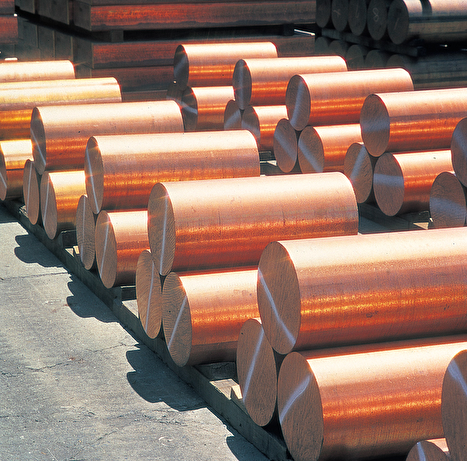How Copper Products Contribute to Sustainable Practices in Various Fields
In eco-friendly power systems, for example, copper improves the functionality of solar and wind innovations, while its application in building reduces waste with longevity. As sectors look for to embrace more lasting practices, the function of copper could prove crucial in attaining environmental goals.
Copper in Renewable Power
Copper plays an essential duty in the innovation of sustainable energy modern technologies, acting as a vital conductor in different applications. Its exceptional electric conductivity and resistance to deterioration make it an ideal product for electric wiring, which is important in photovoltaic panels, wind turbines, and power storage systems. In solar photovoltaic or pv systems, copper is used in the interconnections and circuitry, enabling effective power conversion from sunlight to electricity.
In wind power, copper is integral to the generators and transformers that transform kinetic power right into electrical power, guaranteeing optimum performance and dependability. Furthermore, the demand for electrical vehicles (EVs) is boosting, with copper being a vital element in batteries, electric motors, and billing infrastructure. The change to EVs substantially boosts the need for copper, as these lorries typically utilize four times more copper than conventional interior combustion engine vehicles.
As the globe seeks to alleviate environment modification and change to lasting power sources, copper's role ends up being progressively essential. The material not just boosts the performance and resilience of renewable resource systems however additionally sustains the more comprehensive objective of minimizing greenhouse gas exhausts and advertising a lasting future.
Eco-Friendly Building Materials
Recently, there has been a noteworthy shift towards the fostering of environmentally friendly construction materials in response to expanding ecological worries. This modification is motivated by the need for lasting choices that lessen environmental footprints while preserving structural integrity and visual allure.
Copper, understood for its sturdiness and recyclability, has arised as a principal in this sector. It can be made use of in roof, plumbing, and electric systems, adding to energy performance and decreasing waste. Copper's longevity suggests fewer substitutes gradually, additional boosting its sustainability profile.
Additionally, products such as bamboo, reclaimed timber, and recycled steel are obtaining popularity. These alternatives not just provide lowered environmental effect but likewise promote resource preservation. As developing codes progressively emphasize sustainability, engineers and contractors are incorporating these materials into their tasks, fostering technology in design.
The boosting fostering of environmentally friendly building and construction materials shows a more comprehensive dedication to sustainability in the built atmosphere. By focusing on these products, the construction market can dramatically reduce its carbon footprint, line up with governing standards, and support a healthier environment for future generations. This fad marks a critical step towards a much more lasting future in building and construction.
Copper's Duty in Healthcare
Recent researches have highlighted the significant role of copper in health care settings, especially because of its antimicrobial residential or commercial properties. Copper surfaces have been shown to reduce the presence of pathogens, consisting of infections and germs, by as much as 99.9% within a short period. This exceptional efficacy makes copper a very useful product for high-touch surface areas in healthcare facilities, such as doorknobs, bed rails, and IV poles, thereby adding to improved infection control measures.
In enhancement to its straight antimicrobial impacts, copper additionally contributes in the more comprehensive context of medical facility sustainability (Copper Products). By including copper into medical tools and furnishings, healthcare centers can minimize the incidence of healthcare-associated infections (HAIs), which not just improves client end results yet additionally reduces the expenses associated with extensive medical facility remains and added treatments
In addition, copper's sturdiness and recyclability straighten with sustainable techniques, enabling for accountable source administration. As health care systems increasingly prioritize both client security and ecological stewardship, the combination of copper products is ending up being a lot more widespread. This double advantage emphasizes copper's essential contribution to a much healthier, more secure, and much more lasting health care setting.
Sustainability in Transportation

In addition, copper's toughness and deterioration resistance add to the durability of transport infrastructure (Copper Products). In rail systems, as an example, copper components enhance the dependability and performance of signaling and power systems, important for decreasing hold-ups and power intake. In addition, copper's role in you could look here renewable resource systems, such as solar and wind, sustains sustainable transport remedies by providing tidy energy for electrical transit options
Investments in copper modern technology not just foster sustainability yet also promote economic growth and task development in eco-friendly sectors. As sectors strive to meet rigorous ecological regulations, the application of copper products in transportation arises as a pivotal method in attaining sustainability goals and promoting a cleaner, more effective future.
Copper and Round Economic Situation
As the globe significantly welcomes sustainability, the function of copper in the round economic situation ends up being ever more substantial. Copper's innate properties-- such as its recyclability, conductivity, and sturdiness-- placement it as a vital material in a resource-efficient economic climate. The round economic situation intends to lessen waste and make best use of resource usage via recycling and reusing materials, and copper master this regard.
The steel can be reused forever without loss of high quality, making it an ideal candidate for lasting techniques across various markets, consisting of check construction, electronics, and sustainable power. By reprocessing and recuperating copper from end-of-life products, markets can considerably decrease the requirement for virgin products, therefore lowering environmental effects related to mining and processing.
Additionally, the combination of copper right into circular economic situation frameworks not just saves resources however also fosters innovation. Companies that focus on copper recycling contribute to a more sustainable supply chain, improving their competitiveness while aligning with governing needs and customer preferences for ecologically responsible items.
Verdict
In final thought, copper items substantially contribute to sustainable methods across numerous industries. Their important function in boosting renewable resource modern technologies, advertising environment-friendly construction materials, sustaining infection control in healthcare, assisting in sustainable transport, and symbolizing the principles of a round economic climate underscores the versatility and relevance of copper. By incorporating copper right into numerous applications, industries can attain higher performance, reduce environmental influence, and line up with international sustainability objectives, eventually promoting a more sustainable future.

Copper's excellent conductivity makes it a recommended product in electrical car (EV) systems, enhancing power effectiveness and efficiency. Additionally, copper's role in renewable power systems, such as solar and wind, supports sustainable transport remedies by providing clean power for electric transportation alternatives.
Their essential role in enhancing sustainable energy modern technologies, promoting green construction materials, sustaining infection control in health care, helping with lasting transportation, and personifying find this the concepts of a round economic climate emphasizes the versatility and significance of copper.